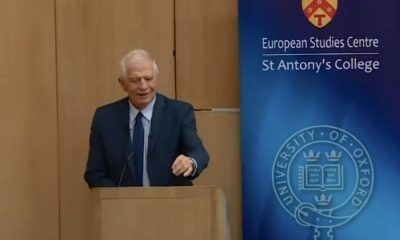Corona virus
Com afecta # COVID-19 a #Erasmus i #EUSolidarityCorps

Education has been hard hit by the COVID-19 crisis. Travel restrictions and the closing of universities mean participants in cross-border mobility programmes, such as the Erasmus + student exchange and the Cos de Solidaritat Europea, are facing challenges.
Currently, 165,000 young people across Europe are on an Erasmus exchange and 5,000 more are involved in volunteering projects.
-
25% of student exchanges were cancelled due to COVID-19
-
37.5% of students experienced at least one major problem related to their exchange (for example: couldn’t go home, accommodation problems)
-
Half of the students whose programme continued have moved to online classes
-
34% have moved to partial online offers or partially postponed classes.
How the EU is helping
To help young people who are volunteering or taking part in Erasmus+, as much as possible, the European Commission has said it will make the programmes as flexible as legally possible.
It has recommended that the national agencies, responsible for the management of study exchanges, invoke “force majeure”, which would allow them to assess the possibility of approving additional costs up to a maximum grant amount and to postpone planned activities for 12 months.
Parlament comitè de cultura i educació has called on the Commission to do everything possible to provide support, clear information and reassurance for participants.
En una letter to Mariya Gabriel, the commissioner responsible for youth and education on 15 April, MEPs ask the Commission to ensure that:
- Màxima flexibilitat is applied, in particular to help those who have had to return to their home countries for safety reasons
- All exceptional costs in connection with Covid-19 are reemborsat
- Exchange students and participants of the Solidarity Corps programme retain their status
- Intercanviar estudiants do not lose the academic year and can obtain the ECTS credits through remote study arrangements.
-
Started as a student exchange programme in 1987, but since 2014 also offers opportunities for teachers, trainees and volunteers of all ages.
-
Currently covers 33 countries (all 27 EU countries, plus UK, Turkey, North Macedonia, Norway, Iceland and Liechtenstein) and is open to partner countries across the world.
-
More than nine million people have taken part in the Erasmus+ programme over the past 30 years and nearly 800,000 people benefited from the programme in 2017 alone.
MEPs also asked the Commission to keep the culture and education committee updated about the number of participants currently on an exchange, their situation and the measures taken to support them. On 4 May, the committee again debated the issue with Commissioners Thierry Breton and Mariya Gabriel.
Llegiu 10 coses que la UE està fent per lluitar contra la COVID-19 i reduir-ne l'impacte.
-
Created in 2018 to replace the European Voluntary Service
-
Aims to give young people the opportunity to volunteer or work on projects in their country or abroad
-
Aims to help vulnerable communities and people across Europe by bringing together young people who want to build a more inclusive society
 Erasmus in the time of COVID-19 ©Franz12/AdobeStock
Erasmus in the time of COVID-19 ©Franz12/AdobeStock Comparteix aquest article:
-

 Política Exterior i de SeguretatFa dies 5
Política Exterior i de SeguretatFa dies 5El cap de política exterior de la UE fa una causa comuna amb el Regne Unit enmig de la confrontació mundial
-

 IranFa dies 4
IranFa dies 4Per què encara no s'ha abordat la crida del parlament de la UE per incloure l'IRGC com a organització terrorista?
-

 BrexitFa dies 3
BrexitFa dies 3Un nou pont per als joves europeus a banda i banda del Canal
-

 KyrgyzstanFa dies 4
KyrgyzstanFa dies 4L'impacte de la migració massiva russa en les tensions ètniques al Kirguizistan



























